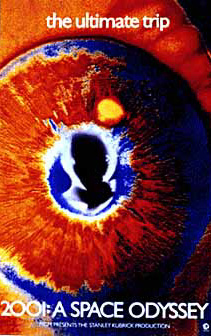|
"A Scientist's Evaluation of 2001," page 4 |
|||||
Under the control of the extraterrestrials, Dullea is swept out of the universe as we know it. (He does not, as many have supposed, land on Jupiter.) After a pan away from Jupiter, the "trip" begins with a series of weird images that, in 70-mm. widescreen presentation, are very impressive. Although Kubrick's abstractions are quite striking, the effects are actually somewhat repetitive and lack the brilliant creativeness of such abstract film artists as Jordan Belson. Much of the abstractions' power results from the medium itself; the 70mm film, the huge screen and the high-fidelity sounds. |
|||||
 |
|||||
Kubrick uses some aerial cinematography with what seems to be intense negative color. The red sandstone of Monument Valley becomes green and the eroded pinnacles of Bryce Canyon become even more fantastic than they naturally are. Dullea eventually finds himself and the space pod in what can only be described as a futuristic Louis XVI apartment with a glowing translucent floor. In this apartment, he sees himself age and die in a matter of moments. This sequence has the weird feeling common to experimental films of the 1930s and 40s. As Dullea lies dying, there is a slab at the foot of the bed. The astronaut dies and is reborn as a new transcendental being; his embryo is shown returning to earth. The implication seems to be that the first slab gave man the spark that turned him into a tool-using animal; now man has been elevated beyond tools. Another major step in man's development has occurred. The basic theme of "2001" is the interaction of extraterrestrial entities with man. There is a Nichiren sect of Buddhism (Shoshu Sokagakkai) that venerates a 12-foot, black cedar tablet (Dai-gohonzon) that bears a striking resemblance to the extraterrestrial slab in "2001." Whether or not the resemblance is a coincidence, I don't know. (Arthur C. Clarke says he has no religion but is sympathetic to Buddhism.) The basic objection here is the overwhelming evidence that evolution is a natural process. There is no known objective reason to postulate extraterrestrial influence in human evolution. The success of "2001" will doubtlessly inspire many would-be imitators. Most will probably miss the key ingredient of Kubrick's success. The real lesson of "2001" is that there now exists a large, visually oriented audience, predominately young, that is ready and willing to pay for mind-stretching films. To tap this market, filmmakers will need something many of them, especially those in the science-fiction field, have seldom evidenced: high-level, intelligent creativity. |
|||||
|
Used with permission of the author.) |
|||||
 |
|||||
|
Purchase your copy of "2001: A Space Odyssey" on DVD from Amazon.com |
|||||
|
Introduction / Page 1 / 2 / 3 |
|||||
|
Home / Hollywood Stories / Film Sound / Movie Props / Locations Trivia / Events / Tributes / Recommendations / Blog / About Bibliography / Links / FAQs / Shop / Message Board / Disclaimers / Site Map |
|||||
Please support our site by visiting our affiliates: